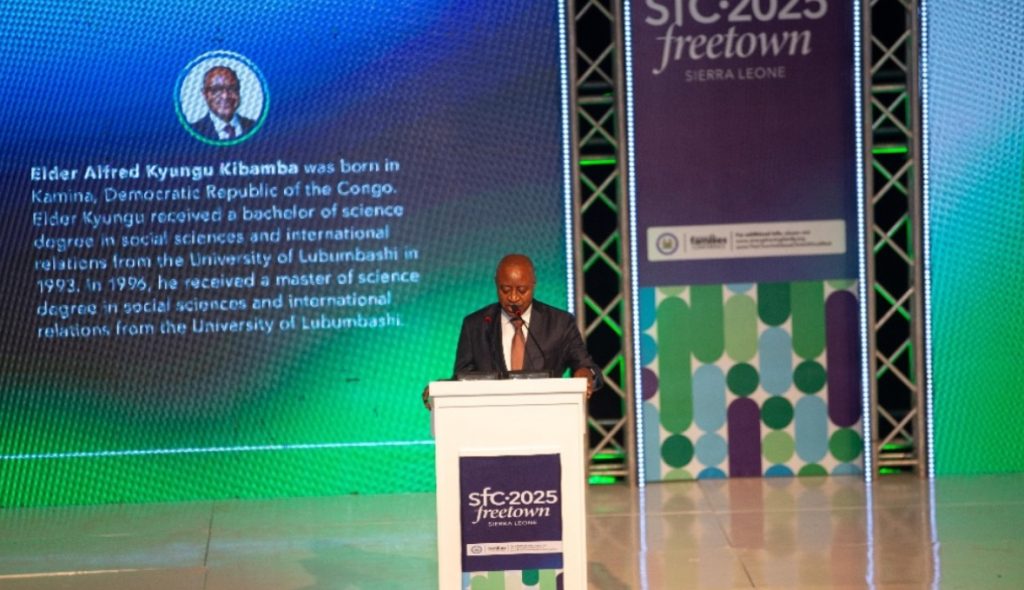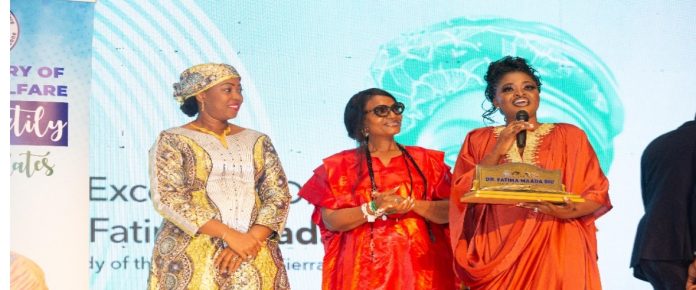AYV News, July 1, 2025
Day Two of the 7th Strengthening Families Conference (SFC 2025) concluded with significant commitments to advancing child protection and women’s empowerment as essential pillars of sustainable development and social cohesion. Held at the Bintumani National Conference Centre, Freetown, it featured impactful presentations, panel discussions, and policy declarations that underscored the urgent need to strengthen families through child protection and women’s empowerment.

Under the theme ‘Resilient Families, Stronger Communities’, the event convened faith leaders, government representatives, gender activists, and development stakeholders from across West Africa at a gathering which produced tangible and realistic, actionable goals aimed at reinforcing family structures, supporting survivors of abuse, and promoting regional collaboration on protective policies. Against the backdrop of rising economic pressures, social instability, and widening inequalities, participants explored how protecting children and supporting women serve as foundational pillars for building resilient societies across the region.
Family-centred approach
Elder Alfred Kyungu, President of the Africa West Area of The Church of Jesus Christ of Latter-day Saints, delivered the keynote address, where he stressed families’ crucial role in shaping future generations. “Children are shaped by their experiences; hence, families must create a conducive environment that contributes not just to their physical well-being but to their emotional and spiritual health,” he stated.
He advocated for compassionate discipline rooted in structure rather than fear as necessary for driving correction without abuse. “It is crucial to correct children with love, not fear,” Elder Kyungu added, as he called on parents and guardians to build homes where empathy and guidance complement each other.
Legacy project announcement
Elder Kyungu announced a significant legacy project—a 54-bed safe house for victims of gender-based violence—developed in partnership with the Office of the First Lady of Sierra Leone, Dr. Fatima Maada Bio. The facility will include four dining rooms and comprehensive support services. “This facility will not only provide safe shelter but also offer counselling and support services to help survivors rebuild their lives,” he announced, and added that the Social Welfare Department will manage the project, expected to be completed within eight months.
Championing women’s empowerment
Sheikh Ibrahim Barrie, an influential voice in religious and political circles, addressed women’s empowerment from an Islamic perspective during opening remarks. “In Islam, a whole chapter of the Quran is dedicated to women—a testament to their value and role in society,” he said. “We must create an environment where women can thrive and not just survive. Empowering women is not only a moral duty; it is necessary for our progress as a people,” he added.
Youth advocacy
Grace Ada Brown, a gender activist and the conference’s youngest speaker, delivered a compelling personal narrative highlighting family support’s transformative power. “The strength of a nation depends on the strength of its families. My journey has been shaped by the unwavering support of my family,” she shared.
Ms. Brown called on families to adopt best practices fostering unity and resilience, including shared faith, emotional support, and open communication. “When families are strong, communities thrive. Let us work together to ensure that every child feels loved, seen, and supported,” she noted.
Expert presentations address critical health and education challenges
Tonya Waite, Co-Chair of the Protect Child Health Coalition and founder of ESTEEM-USA, highlighted alarming health risks facing children, particularly rising HIV/AIDS rates. “The statistics on HIV/AIDS are staggering, and we must take proactive measures to educate our children about sexual health and risks,” she stated. She further said that equipping families with the knowledge they need would lead to an increase in protecting children from health risks and promote overall family well-being.
Jennifer Hogge Ellsworth, Global Head of Engage Now Africa, emphasised the importance of sustainable health systems for family resilience. “We must ensure that families have access to resources that promote their well-being,” she remarked.
Sharon Slater, President of Family Watch International, alongside Legal Advisor Greg Slater, addressed emerging educational challenges impacting child protection. “Parents must be intentionally present in their children’s lives. This means asking questions and spending quality time together,”Sharon Slater advised. Greg Slater added that it was essential for both parents and children to be educated about emerging ideologies, emphasising that such awareness was necessary to safeguard children from potential harm and confusion.
Panel discussion on community-based solutions
The panel discussion brought together regional experts addressing the practical challenges of implementing child protection measures across diverse communities.
Daniel F. H. Kettor, Executive Director of the Rainbo Initiative – Sierra Leone, underscored community-based support systems for child advancement. “Protecting children starts with building trust between families and the institutions designed to help them. When families know there is a safe place to turn in times of crisis, it becomes easier to break cycles of abuse and neglect,” he stated.
Blessing Kutubu, a child rights and gender activist, addressed the cultural and gender dimensions of child protection. “We must challenge harmful norms that silence victims and normalise violence,” she said, adding that empowering girls and educating boys is key to creating lasting change in families.
Christiana Ogbemoye Oliko, representing Nigeria’s Federal Ministry of Women’s Affairs, focused on policy development and regional collaboration. “No country can address these challenges in isolation,” she remarked. “We need a shared commitment across West Africa to invest in family strengthening policies and child protection services that leave no child behind,” she added.
First Lady honoured
The conference concluded with a special recognition ceremony honouring Dr. Fatima Maada Bio for her exceptional contributions to women’s empowerment and child protection. She received awards from The Church of Jesus Christ of Latter-day Saints, Sierra Leone’s Social Welfare Department, and Liberian representatives, acknowledging her tireless advocacy for women’s rights and regional impact across West Africa.
Exhibition showcased local initiatives
The event featured exhibitions showcasing local women-led businesses and organisations dedicated to family welfare. Attendees explored various initiatives aimed at empowering women and protecting children, fostering collaboration and innovation throughout the region. Participants departed with concrete action plans and strengthened partnerships, demonstrating renewed commitment to implementing discussed strategies and continuing vital work protecting children and empowering women across Sierra Leone and beyond.
About the Strengthening Families Conference
The Strengthening Families Conference (SFC) is an annual gathering that brings together regional leaders, policymakers, faith communities, civil society organisations, and development partners to address critical issues affecting family welfare across West Africa.
Now in its seventh edition, the conference serves as a premier platform for dialogue, knowledge sharing, and collaborative action on child protection, women’s empowerment, and community resilience. The SFC promotes evidence-based approaches to strengthening family structures as the foundation for sustainable social and economic development. The conference is organised in partnership with government agencies, international organisations, and local stakeholders committed to building stronger, more resilient communities throughout the region.

